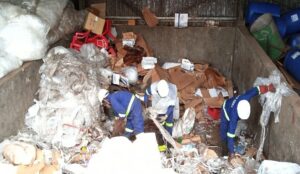A deteriorating urban environment is the enemy of sustainable development. Protecting the evnironment is not an alternative to economic growth—it is a precondition of efficent economic development (UN 1992:25).
Solid waste management is one of the major environmental problems facing city municipalities today. In Kampala City, like other urban centers in Uganda, and in most other developing countries, this important service is based on the local government’s centralized collection, transportation and disposal strategy. Currently this approach has proved to be inefficient due to the heavy financial requirements involved.
There is an urgent need to provide for the safe disposal of the solid waste generated by urban residents and businesses. The increase in urban, economic and industrial activities, as well as the resultant population increase have led to an increase in the quantity of solid waste generated. One method employed in collecting data included field trips to dump sites which are used by the Kampala City Council (KCC). Monitoring of collection points both in the Central Business District (CBD) and in residential areas was also used. Alternative means to waste disposal need to be developed with population growth and economic development in mind. The state of solid waste management in Kampala needs immediate attention if the urban environment is to be saved from further deterioration.



